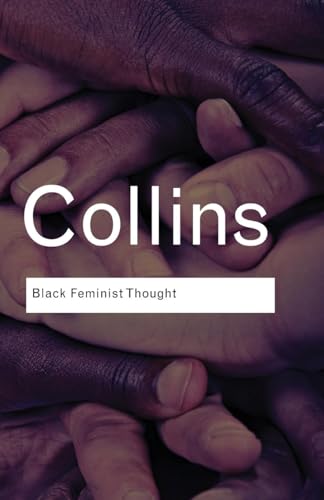Black Feminist Thought
Knowledge, Consciousness, and the Politics of Empowerment (Routledge Classics)
Patricia Hill Collins
BOOK REVIEW

In "Black Feminist Thought: Knowledge, Consciousness, and the Politics of Empowerment," Patricia Hill Collins thrusts the reader into an electrifying arena where the intersecting dimensions of race, gender, and class collide with the raw power of lived experiences. This isn't merely a book-it's a clarion call that reverberates through the corridors of complacency, inviting you to engage, reflect, and confront a reality too often ignored.
From the very first pages, Collins crafts an intricate tapestry of black women's intellectual history, merging scholarship with personal narratives that resonate deeply and authentically. These are not just stories; they are powerful testaments to resilience and strength. Collins argues with fervor that knowledge is not just a collection of facts, but a dynamic force that empowers individuals and communities. Her captivating prose serves as both a critique and an affirmation of black women's unique standpoints, urging readers to acknowledge and celebrate the richness of these experiences. 💥
Embedded in this discourse is the understanding that black feminist thought emerges not in isolation, but within a broader socio-political context. As you traverse this work, you'll discover how historical injustices-such as slavery, segregation, and systemic racism-continue to shape the consciousness and experiences of black women today. This isn't just an academic exercise; it's a gritty exploration that evokes emotions and compels you to grapple with the uncomfortable truths of our collective history.
Critics have both lauded and challenged Collins' groundbreaking perspectives. Some praise her for shining a light on underrepresented voices, arguing that her methodologies provide crucial insights into issues of empowerment and identity. Yet, there are voices of dissent that question the limitations of her framework, suggesting that it may not fully account for the diverse experiences within the black community itself. 🤔 These dialogues elevate the conversation, allowing readers to engage critically and thoughtfully with the content, a hallmark of Collins' influence.
A panoramic vista of black feminist scholarship unfolds as Collins situates her work among the likes of bell hooks, Audre Lorde, and Angela Davis. The praise these scholars have received is not merely due to their accolades, but the profound impact they've had in mobilizing movements for social justice. Their thoughts resonate in the fabric of Collins' work, giving it a temporal context that enriches and amplifies its message.
And let's not overlook the emotional gravity Collins brings forth. The pain, endurance, and triumph of black women are laid out in stark relief, urging you to confront your biases and, perhaps, even your privileges. This isn't just intellectual stimulation; it's a raw, emotional journey that touches the core of human experience. Collins deftly weaves theory with lived reality, as if to say: "Your understanding isn't complete without acknowledging these voices." 🌍
The political implications of Collins' work cannot be overstated. In an age where empowerment is often co-opted by superficial narratives, she anchors empowerment in authenticity and collective action. The book stimulates an urgent need to reassess how power dynamics operate not only in society but within our personal lives. Are you merely a spectator or an active participant in dismantling oppressive structures?
The implications for readers are profound. Collins' work is a mirror reflecting societal flaws and an illuminating guide encouraging you to dismantle them. To ignore it is to ignore a crucial part of the conversation on equality and justice.
Critics from diverse backgrounds have observed that Collins challenges the reader not just to reflect but to act-to join in the relentless pursuit of equity. Those who have embraced her teachings often find themselves at the forefront of advocacy and activism, fostering communities that uplift rather than divide.
Ultimately, engaging with "Black Feminist Thought" is an invitation to expand your consciousness and to embrace an empowered state of being-one where knowledge transforms into action, and awareness breeds compassion. As you dive into its pages, prepare for a journey that will reshape your understanding and ignite a fire within you to challenge the status quo. This is not just a read; it's an awakening into the complexities of empowerment and identity that demands your attention and action. Will you answer the call? 🔥
📖 Black Feminist Thought: Knowledge, Consciousness, and the Politics of Empowerment (Routledge Classics)
✍ by Patricia Hill Collins
🧾 384 pages
2008
#black #feminist #thought #knowledge #consciousness #politics #empowerment #routledge #classics #patricia #hill #collins #PatriciaHillCollins